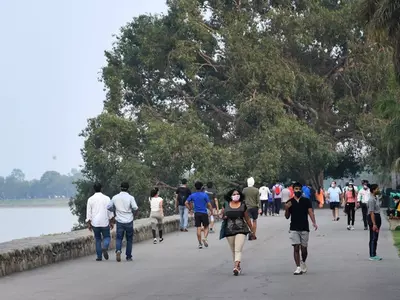

Chandigarh gets Pollen Calendar to help people fight allergies (Tribune India)
<p>
Chandigarh now has its first pollen calendar, which can identify potential allergy triggers and provide a clear understanding for clinicians as well as allergy sufferers about their causes in order to help limit their exposure during high pollen loads.</p>
<p>
About 20-30% of the Indian population suffers from allergic rhinitis/hay fever, and approximately 15% develop asthma. Pollens are considered major outdoor airborne allergens responsible for allergic rhinitis, asthma, and atopic dermatitis in humans.</p>
<p>
The calendar developed by the Post Graduate Institute of Medical Education and Research (PGIMER) perhaps also sets an example for more cities in the country to follow suit.</p>
<p>
Pollen calendars represent the time dynamics of airborne pollen taxa in graphical form in a particular geographical area. They yield readily accessible visual details about various airborne pollen taxa present throughout the year, with their seasonality in a single picture. Pollen calendars are location-specific, with concentrations closely related to locally distributed flora.</p>
<p>
<strong>Also read:&nbsp;</strong> &nbsp;&nbsp;<a href="https://www.indianarrative.com/science-news/tuna-bouncing-back-but-sharks-face-extinction-due-to-overfishing-112568.html">Tuna bouncing back but sharks face extinction due to overfishing</a></p>
<p>
Department of Community Medicine and School of Public Health, PGIMER, Chandigarh, examined the seasonal periodicities of airborne pollen spectrum to develop the pollen calendar.</p>
<p>
This will help prepare early advisories and disseminate them through media channels to the citizens so that they can use protective gear during the period when the concentration of allergic pollens will be high. It is also a preventive tool for sensitive people to diminish exposure when the levels of aero-pollen are high during specific periods.</p>
<p>
The PGI team explored the main pollen seasons, their intensities, variations, and aerobiologically significant pollen types in Chandigarh. The study also highlighted the variability of crucial pollen types in different seasons. The prominent airborne pollen dominating seasons were spring and autumn, with maximum species surfacing when the phenological and meteorological parameters are considered favourable for pollen grains&#39; growth, dispersion, and transmission.</p>
<p>
The study supported by the Centre&rsquo;s Department of Science and Technology (DST) was recently published in Atmospheric Environment, a journal by Elsevier</p>
<p>
Dr. Khaiwal, the lead investigator, said that Chandigarh had reported a remarkable increase in forest cover in recent years, and rise in green spaces would also increase airborne pollen, consequently increasing pollen-related allergic ailments.</p>
<p>
<strong>People can access the Pollen Calendar of Chandigarh through the website</strong> (<a href="https://www.care4cleanair.com/champ">https://www.care4cleanair.com/champ</a>).&nbsp;</p>
Follower of the Dalai Lama expressed their elation at his statement that Gaden Phodrang Trust…
The Foreign ministers of the Quad nations met in Washington, DC, on July 1 to…
Ahead of the Dalai Lama's 90th birthday celebration, the Tibetan Buddhist oracle, Nechung, comes in…
The Union Cabinet, chaired by Prime Minister Narendra Modi, on Tuesday approved the National Sports…
Residents of Muzaffarabad in Pakistan-occupied Jammu and Kashmir (PoJK) are grappling with ongoing disruptions in…
Residents across Pakistan's Karachi continue to grapple with a worsening water shortage, as electricity supply…